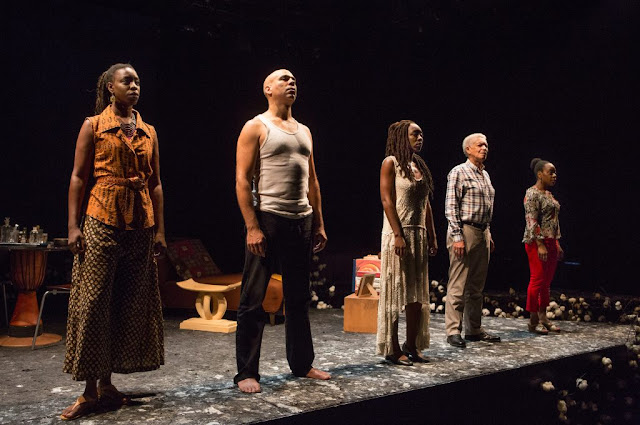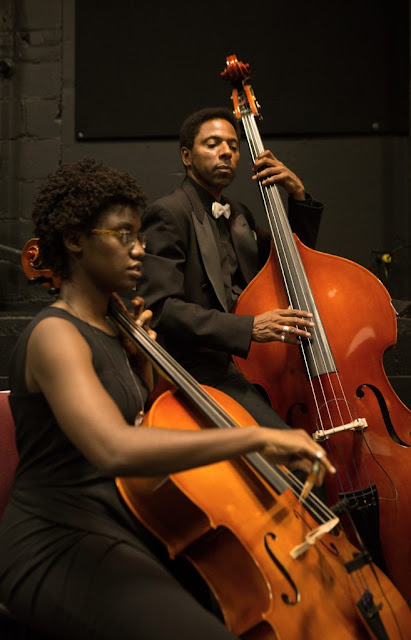HARLEM
21 years ago a Nigthwood Theatre production of a devastatingly beautiful Canadian play premiered at the Tarragon Extraspace. Over those two decades the play has become acclaimed internationally and has garnered complex reviews that at times take part in a racist discourse that the play examines through the playwright’s complex and astute way of writing particular histories and staging them in ways that challenge racist assumptions about the theatre;
I remember there was one negative review of Harlem Duet where the reviewer spent a paragraph and a half talking about the white woman who didn't appear in the play, and I'm thinking, that's interesting, that's curious, since the play isn't about white people I think that the review reflected her own discomfort with seeing herself as other, or not central to this story. So it must have been hard for her to relate to the protagonist, who was Black. Until recently, a lot of Canadian plays didn't really have Black people as the central or principal characters, so I think a lot of discomfort is reflected there. Plus, there are some conscious thematic choices that I made in order to encourage people to look at their own ideas on race, to look at their own contradictions.
- 2004http://www.canadianshakespeares.ca/i_dsears.cfm
The current Tarragon mainspace production of Harlem Duet, with two more shows this weekend, is a worthy testament to the timeless quality of this masterwork. Djanet Sears has crafted, through the use of complex musical and linguistic structures, what she calls “A rhapsodic blues tragedy.” The early incarnations of this structural choice, in the opening moments, create a spoken melodic inroad/introduction into what is in store. By the end of the play each character has been given the actor’s dream opportunity of being able to infuse, into this beautifully wrought language, their own immense skill and emotional aptitude.
the ensemble
The ensemble, led by Virgilia Griffith as Billie/She/Her, and supported by Beau Dixon as Othello/He/Him, Walter Borden as Canada, Tiffany Martin as Amah/Mona, and Ordena Stephens-Thompson as Magi, create an impeccable cast that moves through this multi- tiered drama - from pre-emancipation eighteen sixties scenes, to 1928 sequences during the Harlem Renaissance, and contemporary Harlem in an apartment located at the corner of Martin Luther King and Malcolm X Boulevards.
Tiffany Martin and Virgilia Griffith
As a prequel to Shakespeare’s Othello, the play stands alone as a eloquent and dire foreshadowing to so much that has come to pass over the past two decades, and beyond. The Shakespearean revisionist element adds an added ominous layer for anyone familiar with the plight of Desdemona once Othello changes partners and becomes trapped within complex dual histories of racist oppression.
Onstage musical accompaniment - Cello (Cymphoni Fantastique) Bass (Bryant Didier) becomes a powerful component during key moments throughout the narrative. Walter Borden’s second act appearance adds a bittersweet lightness and genuine emotion through the actor’s immense skill at creating intricate vocal and physical presence to each line he delivers. Like the rest of the ensemble, he has taken the playwright’s powerful language and featured it as the dramatic poetry it is meant to be.
Onstage musical accompaniment - Cello (Cymphoni Fantastique) Bass (Bryant Didier) becomes a powerful component during key moments throughout the narrative. Walter Borden’s second act appearance adds a bittersweet lightness and genuine emotion through the actor’s immense skill at creating intricate vocal and physical presence to each line he delivers. Like the rest of the ensemble, he has taken the playwright’s powerful language and featured it as the dramatic poetry it is meant to be.
Historically Harlem Duet is a uniquely Canadian play set largely within an American environment, with strong symbolic gestures made toward Nova Scotia in particular in one comical yet portentous line - “I can't take it no more, I'm moving to Nova Scotia.” Sears has referred at length, in a 2004 interview, to the phrase, and how it reflects a complex reference to Canada and Canadian identity.*
With only two performances left don't miss this opportunity to see the 21st anniversary production of a truly timeless play.
Ordena Stephens-Thompson and Walter Borden
photos by Cylla von Tiedemann
___________________________________________
*I probably haven't read all the criticism about the play that exists. I've read a piece by Leslie Saunders and a piece by someone else … But what it says about Canadian identity…? I think one of the things that is clear to me is the role of Canada in the play. The play is set in Harlem in New York, and I remember when Winnie Mandela came just after Nelson had been released from prison, when they were still together, and she said that Harlem was the Soweto of America. And it is, it's a central location is the psyches of Black people. Harlem is almost mythological. It's this place where the best and the worst of everything Black exists or has existed. It has an extraordinary history, a rich culture and my relationship to it is borderless, very much like my relationship to Blackness. Harlem feels like another country, not exactly the USA, a country unto itself that I am part of as well.
But in the midst of the play, a character called Canada shows up. The character Canada is in a way a reflection of Canadian identity. Historically, Canada has been known as a place of hope for escaping African slaves and freed Africans in the Americas. You know, we follow the North Star to Canada. However, the character Canada is portrayed in the play as flawed. You know, Billie's father, Canada, comes to Harlem, but he's unable to change her situation, he's unable to make things better for her. However, he does remain a strong symbol of hope in the play, in terms of relationships, relationships between men and women, fathers and daughters in this particular case, but the relationship is still flawed. It's not this ideal father coming to save the day. There's even a phrase that's used in the play that is an actual common saying used by Black people in South Carolina. I've forgotten the quote exactly but it's something like “I can't take it no more, I'm moving to Nova Scotia.”
But the truth about Nova Scotia is far from glamourous. Canada is not Canaan land, but there is hope here. Even amidst the flaws and the criticisms I have of the country, it's the place where I choose to live; it's the place that has the most hope for me. There's a possibility of something here for me.
for the full 2004 interview on Harlem Duet with Djanet Sears;
- 2004http://www.canadianshakespeares.ca/i_dsears.cfm
HARLEM DUET RUNS UNTIL SUNDAY OCTOBER 28TH







No comments:
Post a Comment